What's behind Venezuela's economic woes?
- Published
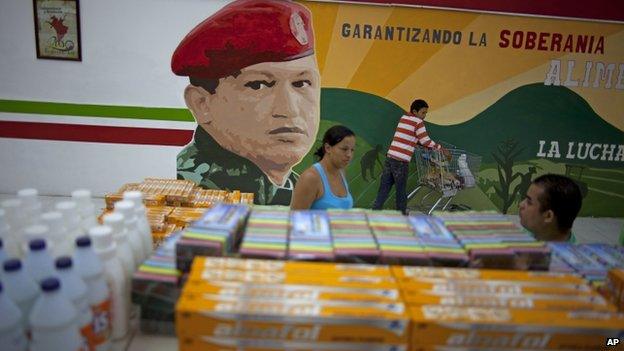
The opposition blames the late president, Hugo Chavez, and his successor Nicolas Maduro for Venezuela's economic problems
Venezuela faces a host of challenges in 2014: it has one of the highest murder rates in the world and is deeply politically polarised. But arguably it is the poor state of its economy that is the most pressing of the problems facing President Nicolas Maduro. The BBC's Irene Caselli in Caracas takes a closer look at Venezuela's economy.
What are Venezuela's economic problems?
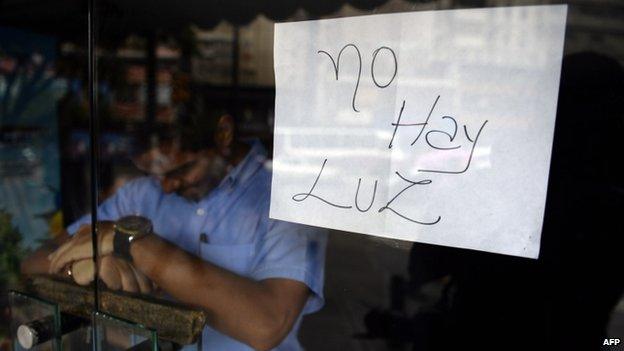
Blackouts, common in some rural parts of Venezuela, have also hit the capital, Caracas, in 2013
Venezuela suffers from the region's highest inflation, also one of the world's highest rates. The country's annual inflation rate for 2013 was 56.2%.
Certain staples, such as milk and toilet paper, are not always easily available in all shops, with shoppers often having to go to a number of supermarkets to find the items they want, and large queues at supermarkets forming when those items are available.
There are also regular blackouts - Caracas was hit twice in 2013, but they are much more frequent in the rest of the country. And there is a dollar black market.

Why is there a black market in dollars?
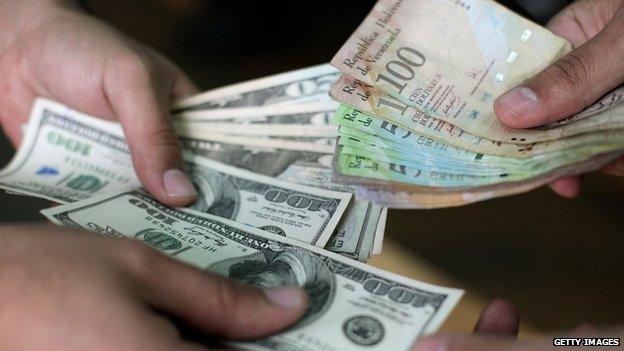
There is a fixed rate for buying dollars, but on the black market dollars sell for 10 times as much
The Venezuelan government imposed controls over foreign exchange in 2003, following a troubled year which saw a coup against the late president, Hugo Chavez, as well as a three-month long oil strike which undermined the country's economy.
Mr Chavez decided to impose controls on foreign exchange to avoid capital flight and to control the prices of food staples.
The government set a fixed rate at which the dollar could be bought and started controlling sales of foreign currency.
People and businesses can now receive US dollars at the official rate only by applying to a government currency agency, and then only for the purpose of importing goods or to pay for foreign travel.
The amount of dollars available at the official rate is restricted, but the demand remains high. This causes the black market to flourish.

How does the black market work?
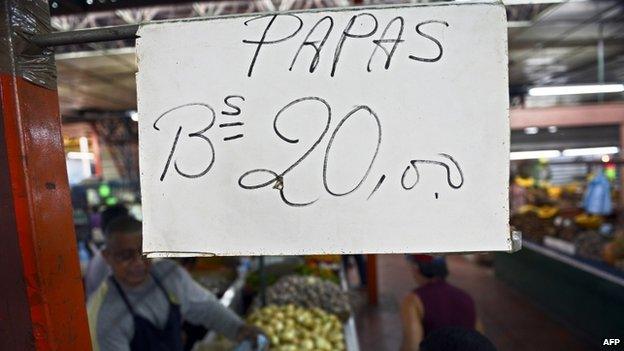
Inflation is running high in Venezuela making it harder for people to fill their shopping baskets
While changing money on the black market is a crime, it is very easy to find a trader.
The official exchange rate is currently 6.30 bolivars to the dollar. On the black market, the exchange rate is 10 times higher.
Venezuelans calculate their cost of living according to the black market exchange rates, and prices of property as well as used cars grow according to the black market rate.

Why is the black market a problem for the economy?
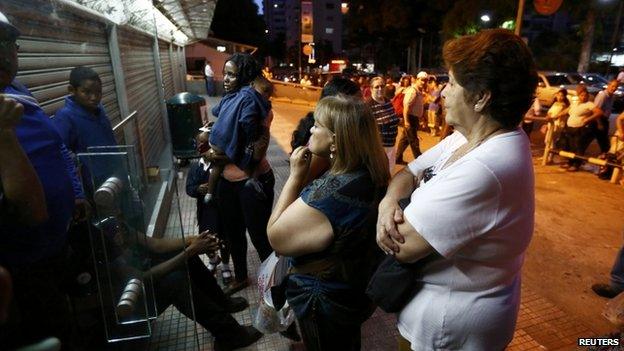
When word gets round that a supermarket carries sought-after products, queues form quickly
Analysts say the black market creates distortions in the economy and leads to a dual economy.
This means that those Venezuelans who earn in dollars or have easy access to dollars have a growing buying power thanks to the black market, because their dollars buy more bolivars every day.
At the other end of the spectrum there are Venezuelans whose salaries lose buying power because of the high inflation rate.
While the government has raised minimum wages, this has not been enough to catch up with inflation. Analysts also say the fixed exchange rate is to blame for other problems the Venezuelan economy is experiencing, such as shortages.

Why are there shortages?
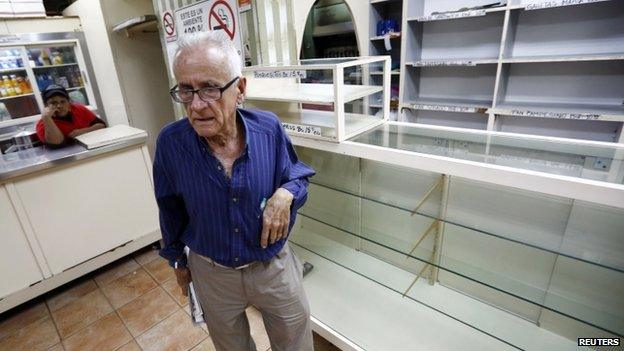
Shortages of basic staples such as bread have angered shoppers
Venezuela depends on imports for many products. If companies cannot easily access dollars, imports become difficult.
This, combined with inadequate domestic production of food staples, is creating shortages.
According to Venezuela's central bank, the scarcity index is above 20%.
This indicates that several items are not always available everywhere. This has been the case for toilet paper, sugar, milk and certain medicines.
While this does not mean that Venezuelans cannot get access to food, it does mean that they may have to go to different supermarkets and search over several days to source everything on their shopping list.
Or they may have to pay higher prices on the black market to get what they want, when they want it.
The government blames shortages on businessmen who are trying to boycott the system.

What is the government doing?
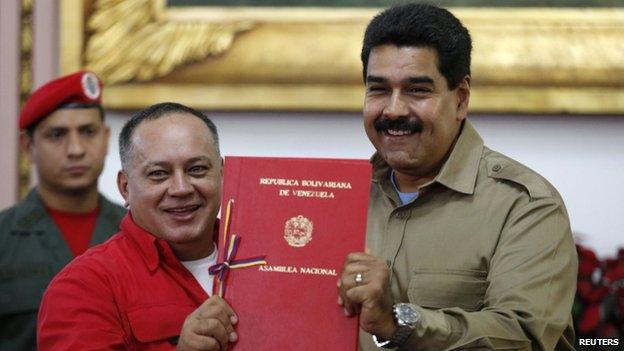
The National Assembly gave President Maduro decree powers so he can pass laws without their prior approval
In November, President Nicolas Maduro ordered the seizure of a chain of electronics stores, accused them of overcharging, and forced them to lower their prices.
A few weeks later, the National Assembly granted Mr Maduro special decree powers that allow him to pass laws without the assembly's approval.
After receiving decree powers, the president signed several laws governing the economy.
He established caps on profits and fair prices for consumers. He also signed a decree that regulates the price of cars.
The government has also signed agreements with private firms, such as Samsung, in order to provide more electronics for the domestic market.

Are these measures working?
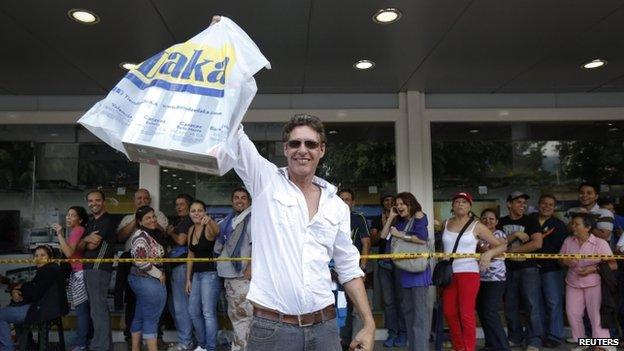
Shoppers were delighted when President Maduro forced a chain of electronic shops to lower their prices
Opponents say these measures will only deepen the economy's distortions, creating more shortages and a more rampant black market.
The government accuses opponents and unscrupulous businessmen of sabotage.
Many expect the government to announce a new devaluation of the bolivar soon, in order to close the gap with the black market.
But the devaluation would be a hard blow for many Venezuelans, and the government so far has been careful not to create discontent.

Does Venezuela's crisis affect the overall economy of the region?
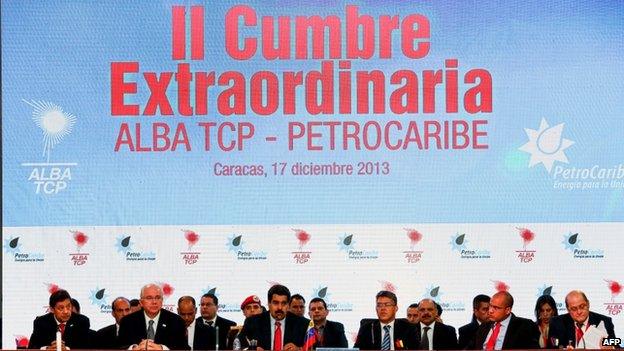
Guatemala has recently left Petrocaribe, the alliance which provides countries in the region with cheaper oil
Venezuela has the world's largest proven oil reserves.
Hugo Chavez used oil to expand his political clout. He founded Petrocaribe, an alliance that provided countries in the region, such as Cuba, Guatemala and Nicaragua, with oil at below-market prices.
But Venezuela may be slowly pulling the plug, cutting shipments and modifying repayment terms, as the country is in need of more liquidity.
In November, Guatemala announced that it was leaving the alliance as costs increased.